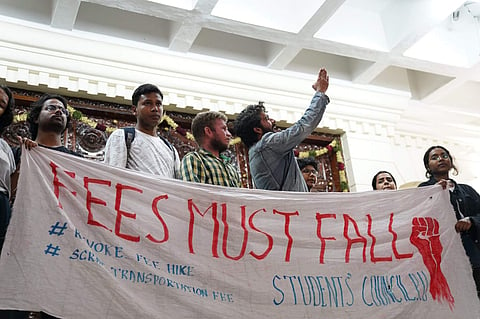

The University of Pondicherry on Tuesday issued the Post Graduate scholarship sanction order stating that students who participated in protests and who have less than 70 percent attendance would not be allowed to avail it. This led to an uproar from the student community who called the move ‘unconstitutional’. The next day, the notice was removed from the college website. But the students claimed they had not received a reply to their emails or an explanation from the administration as to why the notice had been removed.
However, with students across the country increasingly speaking up about suppression of the right to protest and dissent on campuses, this ‘short lived’ controversial circular has left students wondering if this would be the new method of ‘suppressing their voices’. In their statement regarding the circular, the Students’ Council of PU said curtly, “The University wants to punish students for demanding a campus inclusive of socially and economically weaker students. For the kind information of the administration, these scholarships are not from your personal accounts so that you can provide them as loans to the students. It is a student’s right.”
On their website, the University sets the following criteria for those who can avail the PG scholarship - The candidate who secures the highest percentage of marks in the PG admission entrance examination shall be eligible for the award of Merit Scholarship at Rs 500 for the first semester. For the subsequent semesters the Merit scholarship at the same rate of Rs 500 shall be awarded to the candidates based on their class ranks in the previous semester.
Nowhere in their website does the University state any other criteria to attain the scholarships. The Students’ Council is right about one thing - the money is certainly not coming from the pockets of the administrators. The funds are from the UGC - but does the University have the authority to change the criteria for the scholarships? The UGC only grants the money, but the University does have the autonomy to distribute on their terms. So then is their new criteria not in violation of the rules?
Dr G Haragopal, a visiting professor at the National Law School of India University, Bangalore and formerly a National Lecturer with the UGC and worked with them on other projects in the past seems to think so. “Yes, the University does have autonomy and I’m someone who really supports the idea of a University having autonomy. They can of course make their own rules. However, the University is autonomous from the government, it is not autonomous from the constitution,” he pointed out.
Protest, as a fundamental right, is preserved. “It is a student’s constitutional right to protest and if you take away their scholarship because they protested, then does that mean that their merit is meaningless? Our Nobel Prize winner Abhijit Banerjee spent 10 days in Tihar jail because he protested, did that mean he didn’t have merit. How then did he win the Nobel Prize?” the professor questioned.
The professor said what the circular said was highly objectionable and arbitrary as it went against the democratic rights that the constitution grants to the students. “The University has its autonomy but it has to function within the provisions of the constitution. They can set their own norms, frame courses, curriculum and schedules. They have autonomy over all academic matters of the campus. But they have to also follow the constitutional rules, regulations and framework,” he explained.
“The first three rankers from all the 53 departments are granted this scholarship. This is nothing but witch-hunting. It was fee hikes that we were protesting against. And the case is now in the Madras High Court, so why is the administration issuing such circulars? They only want to curb dissenting voices on campus and attack the campus democracy,” Parichay Yadav, the President of the PU Students’ Council said.
Currently, the circular is not available on the website, it is expected that the University will issue a modified, new circular soon. The Union on the other hand, accepted this as a victory, “Student Struggle Long Live,” they wrote on Facebook when it was taken down. But whether this is a good sign or the start of a new method to put student rights under threat, is left to be seen.
